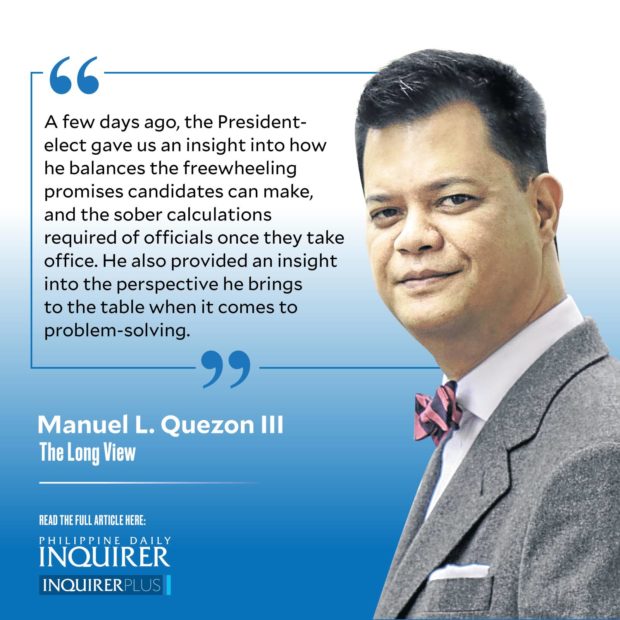Perspective
A few days ago, the President-elect gave us an insight into how he balances the freewheeling promises candidates can make, and the sober calculations required of officials once they take office. He also provided an insight into the perspective he brings to the table when it comes to problem-solving.
First, he stepped back from his previous (campaign) stance of flirting with the idea of reviving the old Oil Price Stabilization Fund. Instead, he now says that a more targeted approach, meaning for the sectors most immediately affected by high gas prices, such as transport and agriculture, is required; and that furthermore, this should be for a limited time only, as better suited to present conditions.
Article continues after this advertisementNext, he gave an insight into how he intends to approach problem-solving. It isn’t necessarily a technocrat’s point of view, or that of a manager, or even, I suspect, that of a traditional (meaning temporary) chief executive; it is, instead, proprietary because of a familial approach.
Referring to the ever-increasing price of oil because of the Ukraine crisis, Ferdinand Marcos Jr. said he wants to negotiate with the Organization of Petroleum Exporting Countries to obtain more favorable prices. “I think the relationship … with the countries in the Middle East by our OFWs will help us because … we already have many dealings with them. So, maybe we can open these negotiations,” he told reporters. As far as that goes, what he said reflects long-standing government-to-government links, dating back to many administrations.
What he said next, however, was revealing. He told reporters how, during the 1973 oil crisis, caused by the Arab-Israeli conflict of that year, his father sent Geronimo Velasco, who was minister of energy, to negotiate on behalf of the Philippines. Accompanying Velasco was Marcos Jr. “And we discussed with Saudi Arabia and all the other oil-producing countries that we buy oil from, to lengthen the payback period. It was from 90 days to 180 days. We were able to manage that … because we were very worried at that time of our foreign reserves,” Marcos Jr. recalled.
Article continues after this advertisementAt the time, Marcos Jr. was 16 years old, still studying at the Worth School in England. The President-elect’s recollections, of course, suggest a precocious childhood. This is, in fact, asserted by his own campaign website which has, next to a picture showing the President-elect watching as Richard Nixon signed the Palace guest book, this first entry in the political timeline of Marcos Jr.’s life, circa 1969: “the young diplomat.”
Interestingly enough, on Dec. 11, 1980, on the seventh anniversary of the Philippine National Oil Company, President Marcos (Senior) delivered a speech recalling the genesis of the oil policies and programs of his government. Three paragraphs make for interesting reading:
“You will recall that in 1973—hardly a year after we had put into operation the mechanisms for establishing political stability—our country was once more confronted by an event that gravely endangered our economic life. The worldwide energy crisis gave rise to uncertainties that not only threatened our capacity for further growth but also cast serious doubts on our capability for national survival.
“The country had no secure supply of oil. The immediate question centered on whether imported oil was to continue to flow into the country in volumes that would sustain our economic growth. We were rudely jolted by the fact that the vital linkages to our traditional oil supplies were under the control of multinationals.
“Again, in 1974, Saudi Arabia notified us that we were stricken off the friendly list. You remember that. And once more, we had to send, first, Minister Romulo; then, the First Lady. In 1974, when not even Minister Romulo could mollify the Saudi Arabian government, the First Lady had to go to England to see the King who was ailing. Then she went to Saudi Arabia and sought out the doctors of the Royal Family. And that was how she got close to the Royal Family.”
What seems to have mattered to President Marcos Sr. was to pay tribute to the efforts of his wife, who’d gone on a 20-day trip. The official Palace account summarized that she:
• Succeeded, with the help of Prince Fadh, Prince Saud, and Ambassador Shoboksi, Saudi Arabia ambassador to the Philippines, in asking King Khalid of Saudi Arabia to restore the supply of oil to the Philippines. The country gets 50 percent of its oil needs from Saudi Arabia.
• Negotiated with Middle East suppliers of crude oil in the United States for a steady supply of crude oil for the country.
• Sought the cooperation of the American Petroleum Institute for the acceleration of the drilling program in the Philippines.
• Obtained the assistance of scientists of the National Academy of Sciences in the United States for the broadening of applicable technology in the development of local energy resources.
Sadly, there is no mention of the contribution of today’s President-elect (or Minister Velasco) in 1973. Perhaps, it was impolitic to take away the spotlight from the former first lady. But her son has been quick to remind us, what sets him apart, is a uniquely British approach to affairs of state. As the Windsors refer to themselves as The Firm, so, too, does the President-elect reveal his perspective: familial and not institutional.
Email: [email protected]; Twitter: @mlq3
RELATED COLUMN
















